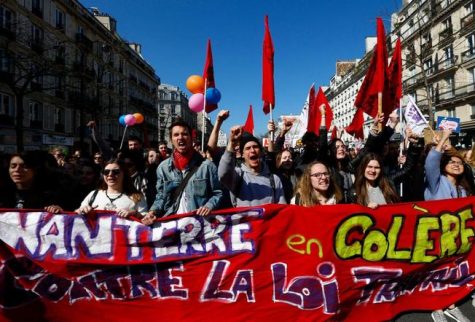Altering Labor Laws in France
Notorious for its relaxed labor laws and lenient work week, France’s government is under fire for recent changes to their labor laws. Setting the background for employers to utilize ethical working practices and for employees to know their rights for ideal working conditions, the country sought to reform such laws since November of last year. Effective from the start of the new year, rallying protest surged through the nation as the working class strove to maintain its once flexible and relaxed working conditions.

The labor code, Code du Travail is set to be redrafted and reprinted in its 3,800 page entirety within a few years and has 125 pages modified to meet the standards of the Socialist Party within France’s jurisdiction. The goals of the redrafted articles pertain to simplifying complex laws to offer a clearer set of guidelines for employers. Concerning issues about the adjustment of working hours over days, weeks or by years was heavily disputed by the public as employers now have the ability to modify vacation and working times as they please. Key targeted reforms include the removal of severance pay for dismissed workers and leniency towards company-mandated operations regarding arbitrary decision making.
Some reforms were beneficial as increased rights of unskilled workers and financial aid options for the younger working class were included. Though the titular 35-hour working week will not be altered overall, some employers can choose to extend the week up to 48 hours if seen fit. Rewritten criteria regarding working hours, rest, and paid leave has sparked controversy within the French public. The spark since resulted in collective protest around various parts of the country as many act out against the reforms.
While both France and the United States share a capitalistic outlook on economic sanctions, France places a broadened emphasis on the rights of workers and the establishment of unions that serve as protective measures for the working citizen. As the labor laws within France’s national code face varying modifications, many citizens complain that such alterations to the law serve to favor employers over the employees, as many modifications allow employers to potentially lay off workers as they see fit.
Though many protests took place after the introduction of labor reforms, one of the most notable was within Paris in March. Masked protesters armed with yellow paint marched forth in the streets as they went head to head with police provisions in the streets along with an estimated 400,000 in the crowd. The protesting labor force consisted of people of all ages and working backgrounds. Some were confirmed high school students, while others were employees that have been working within respective occupations for many years. Things turned amok as Police forces threw tear gas into the crowds of those that propelled stones towards the armed forces in Nantes and Rennes. All over France, protesters have carried lit road flares as a symbol of the uprising. Multiple arrests were made during the protest, and it was noted that the characteristics of protests ranged from being peaceful to violent.

A CGT representative named Jean-Luc Gutel expressed his disdain for the reforms, stating, “Small employees are treated like dirt, we’ve had enough, [and] it’s Hollande who pretends to represent the left.” Frank Hollande, President of France was under criticism for many of the reforms and decided to soften the bills to appeal to the general public’s unhappiness regarding the matter in Mid-March. However, many of those supporting the bill continued in the strife with the same accord, believing that it would lead to “fresh start,” according to Prime Minister Manuel Valls. Many of protesting labor unions have since expressed their desire to continue with the protest until the reforms were dropped entirely, not appeased by the softening of the bill. The prime minister remains firm in his belief, believing that businesses should negotiate terms with their employees. Protesters have continue their criticism, as they believe that working to allow such justifications to go forth betrays the typical socialist reasoning of economic affairs and appeals to a more capitalist outlook, a thought that many in unions choose to discredit. As the government continues its involvement in the alterations of labor laws, the rallying protest continues in France





